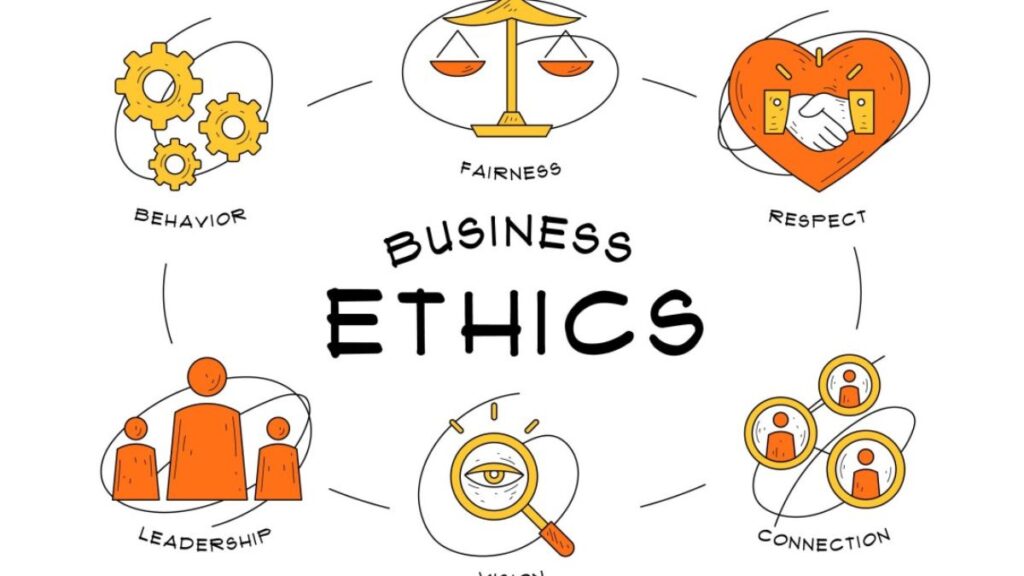Business ethics play a fundamental role in shaping the behavior and decision-making processes within modern enterprises. As businesses continue to grow and evolve, the importance of adhering to ethical principles has become a key factor in ensuring not only their success but also their sustainability. The term “business ethics” refers to the application of ethical values and principles to business activities, guiding how enterprises interact with their stakeholders, including employees, customers, suppliers, and society at large. In today’s competitive and globalized marketplace, business ethics have gained unprecedented significance. This article explores the role of business ethics in modern enterprises, examining its benefits, challenges, and the frameworks necessary for its effective implementation.
The Importance of Business Ethics
In modern enterprises, business ethics are not just about following legal regulations; they are about doing what is right for all stakeholders involved. Business ethics build trust between companies and their stakeholders, fostering long-term relationships and a positive brand reputation. A strong ethical foundation helps businesses avoid legal issues, protect their reputation, and create a competitive advantage in the marketplace.
For employees, ethical practices create a healthy work environment where they feel valued and respected. This, in turn, leads to higher employee satisfaction, increased productivity, and lower turnover rates. For customers, ethical behavior builds trust and loyalty, as consumers are more likely to support businesses that align with their personal values. Suppliers and other business partners also appreciate ethical companies because these businesses are viewed as trustworthy and reliable.
Furthermore, in an era where corporate social responsibility (CSR) is increasingly becoming a demand from consumers and investors alike, businesses that prioritize ethics are better equipped to meet these expectations. Ethical practices lead to more sustainable business models that balance profit with purpose, enhancing corporate social responsibility efforts. Companies that demonstrate commitment to ethical values tend to attract investors and customers who are equally concerned about ethical consumption and responsible investment.
Ethical Challenges in Modern Enterprises
While the importance of business ethics is clear, modern enterprises face numerous challenges in implementing and maintaining ethical standards. One of the major challenges is the conflict between profit maximization and ethical behavior. Many businesses are under constant pressure to increase profits, which can sometimes lead to unethical practices such as exploiting labor, cutting corners on product safety, or engaging in dishonest advertising.
Globalization further complicates the ethical landscape for enterprises, as businesses must navigate diverse legal, cultural, and ethical norms across different countries. What is considered ethical in one region may be viewed differently in another, making it difficult for multinational corporations to maintain consistent ethical practices. For example, labor laws, environmental regulations, and consumer protection standards vary widely across the globe, and companies operating in multiple markets must adhere to local laws while upholding their own ethical standards.
Another challenge is the rise of digital technologies and data privacy concerns. As more businesses move online, issues surrounding data security, surveillance, and consumer privacy have become increasingly prevalent. Companies must balance the use of data for business insights with the responsibility to protect customer privacy. Ethical dilemmas also arise in areas such as artificial intelligence (AI), where businesses must ensure that AI technologies are used responsibly and do not perpetuate biases or cause harm.
Frameworks for Ethical Decision-Making
To effectively manage the challenges of business ethics, modern enterprises need robust frameworks that guide ethical decision-making. One commonly used framework is the “Triple Bottom Line” approach, which evaluates business performance based on three factors: profit, people, and the planet. By focusing on these three pillars, companies can ensure that they are not only profitable but also socially and environmentally responsible.
Another effective framework is ethical leadership, where business leaders set the tone for the organization by modeling ethical behavior and fostering a culture of integrity. When leaders prioritize ethics, it influences the behavior of employees at all levels of the company. Ethical leaders are transparent in their decision-making processes, open to feedback, and hold themselves and their teams accountable for their actions.
Additionally, many companies adopt formal codes of ethics or conduct to provide clear guidelines for employees regarding acceptable behavior in various situations. These codes often address issues such as conflicts of interest, discrimination, harassment, and financial integrity. Having a code of ethics helps to create a shared understanding of the company’s values and standards, making it easier for employees to make ethical decisions.
Another useful tool for promoting business ethics is corporate social responsibility (CSR) programs. CSR initiatives demonstrate a company’s commitment to ethical practices and social good. These programs can include activities such as environmental sustainability efforts, charitable donations, community engagement, and efforts to improve labor conditions. By actively participating in CSR, companies not only improve their reputation but also contribute to the well-being of society.
Benefits of Strong Ethical Practices in Business
Enterprises that prioritize ethics can enjoy several long-term benefits, including enhanced reputation, increased customer loyalty, and improved financial performance. A strong ethical foundation is essential for maintaining trust with customers and stakeholders, which is crucial for the sustained growth and success of any business.
One key benefit of ethical business practices is brand reputation. A company with a positive reputation for ethical behavior is more likely to attract customers who value corporate responsibility and integrity. Consumers today are more aware than ever of the social and environmental impact of their purchasing decisions, and they are more likely to support businesses that demonstrate a commitment to ethical values.
Moreover, companies with strong ethical foundations tend to have better relationships with employees, leading to higher levels of employee engagement, job satisfaction, and retention. Employees who feel that their organization operates ethically are more likely to feel proud of their work and remain loyal to the company. In turn, this helps businesses reduce turnover costs and improve overall productivity.
Investors also favor companies that adhere to ethical standards. Ethical businesses tend to have more sustainable practices, which reduce the risks associated with legal issues, regulatory fines, and negative publicity. Investors see ethical companies as lower risk, and they are often willing to invest in businesses that are committed to long-term sustainability.
Additionally, businesses that prioritize ethics are better able to avoid legal challenges. Operating within the boundaries of the law is essential, but ethical companies go beyond legal requirements by ensuring fairness, honesty, and transparency in their dealings. This proactive approach reduces the risk of lawsuits, government investigations, and regulatory penalties.
The Future of Business Ethics
The role of business ethics in modern enterprises is set to grow even more important in the future as stakeholders increasingly demand transparency, accountability, and ethical responsibility from companies. The rise of environmental, social, and governance (ESG) criteria, which investors use to assess the sustainability and societal impact of companies, has made business ethics a critical factor in investment decisions. Enterprises that fail to meet ethical standards may face reputational damage, loss of customer trust, and reduced access to capital.
Moreover, the future of business ethics will likely be shaped by advances in technology, particularly in areas such as AI, automation, and data analytics. As these technologies become more integrated into business operations, companies will need to establish clear ethical guidelines to address issues such as data privacy, algorithmic bias, and the displacement of human workers by machines.
Companies that successfully integrate business ethics into their core values and operations will be better positioned to navigate the complexities of the modern business landscape. Ethical businesses are not only more resilient but also more likely to thrive in a world where consumers, employees, and investors are placing greater importance on integrity and social responsibility.
Conclusion
Business ethics are an integral part of modern enterprises, providing a foundation for sustainable success, fostering trust with stakeholders, and promoting long-term profitability. While challenges exist, particularly in balancing profit with ethical considerations, companies that prioritize ethical behavior are better equipped to navigate these complexities. Through frameworks like ethical leadership, corporate social responsibility, and codes of conduct, businesses can create a culture of integrity that benefits everyone involved. In the future, as technological advancements and globalization continue to shape the business environment, the role of business ethics will only become more critical for the success and sustainability of enterprises.



